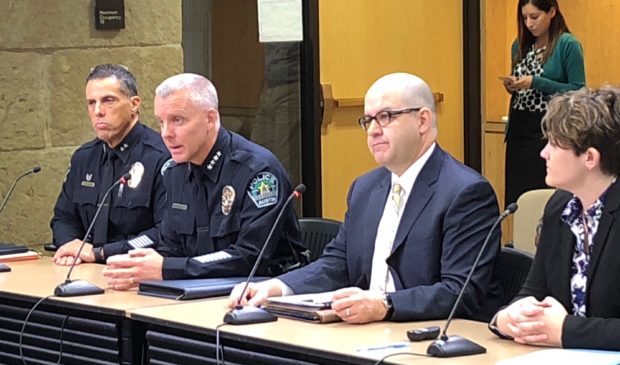APD to make changes in mental health cases
Thursday, September 27, 2018 by
Jo Clifton As a result of Austin Police Department policies, “people experiencing a mental health crisis in Austin may be at higher risk of having a negative police interaction than people in a city that more closely aligns with best practices,” according to an audit report from the Office of the City Auditor, which was discussed at Wednesday’s meeting of the City Council Audit and Finance Committee.
And when auditors analyzed reports of fatal police encounters in the 15 most populated cities in the U.S. as well as Seattle, which has a robust program for dealing with mental illness, they found a startling statistic. The data indicated “APD has the highest per capita rate of fatal police shootings involving persons believed to be experiencing a mental health crisis. APD management noted that Austin may have more people with mental health-related issues than other cities. We could not find data specific to the number of people with mental illness living in Austin as compared to other cities,” auditors wrote.
One of the problems cited by auditors is that APD dispatchers were not automatically sending one of APD’s mental health officers to lead in responding to mental health-related calls. That policy is one of several factors criticized in the audit report, and APD Chief Brian Manley said Wednesday that he has changed the policy.
Manley discussed changes he is making in response to the audit with the Council Audit and Finance Committee. He later told the Austin Monitor his department would be sending mental health officers instead of patrol officers when the situation requires it “in the next week or two.”
The audit also found that the department did not track and review crisis intervention incidents to improve outcomes and was not providing what are considered the best-practice elements in its training of crisis intervention officers, according to the audit report.
In addition, auditors found that mental health officers were not available 22 percent of the time over the four days analyzed in May 2017 and March 2018.
Audit staff contacted other cities to compare their crisis intervention program models against what are called Core Elements, which are recognized by law enforcement as a best-practice model for police-based crisis intervention, the report says.
In several instances APD’s practices were not aligned with the Core Elements or with reported practices in other cities, including Dallas, Houston and San Antonio. Auditors also reviewed practices used by police in Philadelphia, Phoenix and Seattle to deal with mental health crises. Some of those cities are able to track people with mental health challenges by their name or their cell phone number, so that if a person changes locations but is known to have a mental illness police can be advised of that fact before the encounter. However, APD can only trace people by the address where other such incidents have occurred, according to the audit.
Auditors found that APD’s approach to specialized training for mental health officers was different from the Core Elements as well as practices in peer cities.
Manley also told the committee he would form a mental health stakeholders group that would include the law enforcement and criminal justice community as well as the advocacy community and the mental health community, including practitioners, educators and trainers. He promised to do that by December.
Download (PDF, 836KB)
Photo by Jo Clifton.
The Austin Monitor’s work is made possible by donations from the community. Though our reporting covers donors from time to time, we are careful to keep business and editorial efforts separate while maintaining transparency. A complete list of donors is available here, and our code of ethics is explained here.
You're a community leader
And we’re honored you look to us for serious, in-depth news. You know a strong community needs local and dedicated watchdog reporting. We’re here for you and that won’t change. Now will you take the powerful next step and support our nonprofit news organization?






